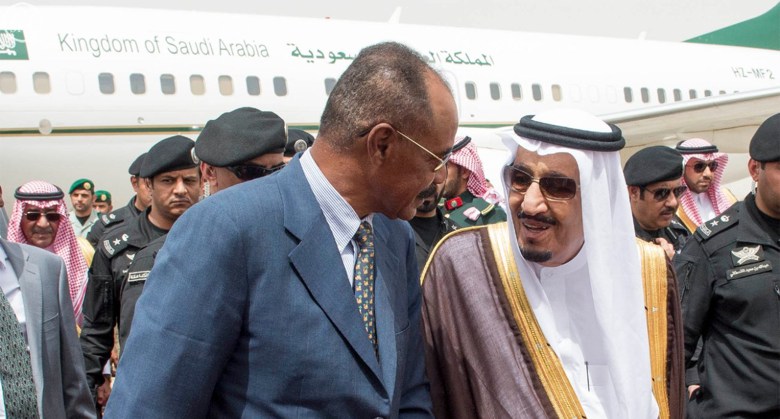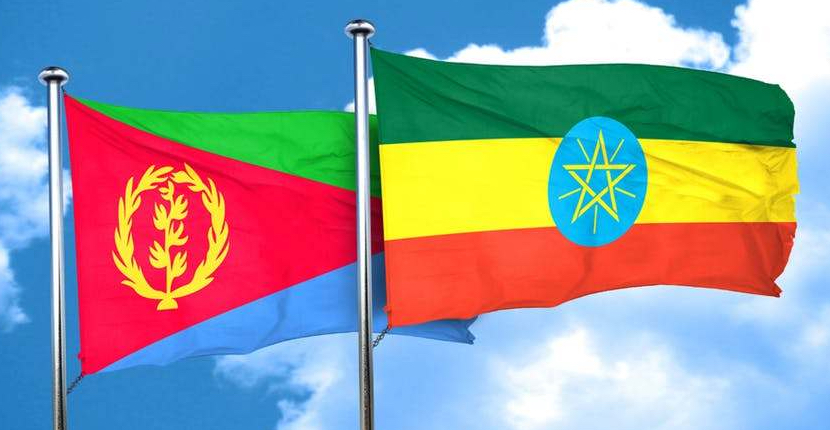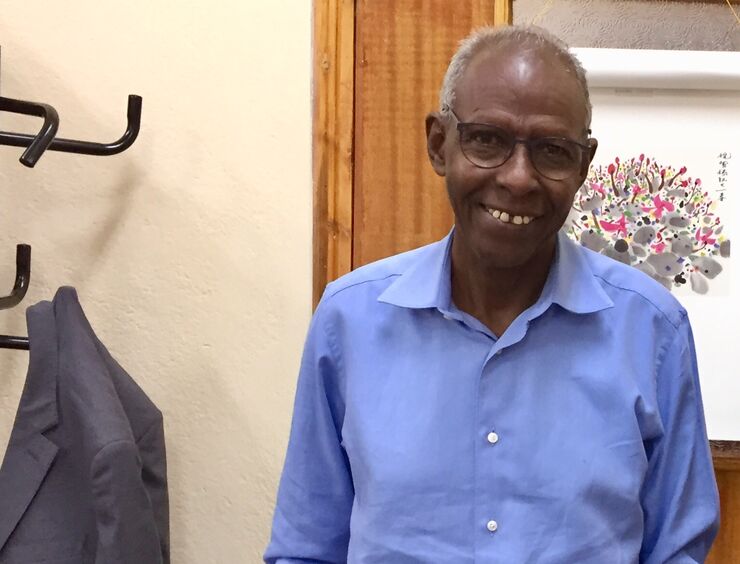An excellent report has been published by the Netherlands Institute of International Relations ‘Clingendael’. It highlights the impact of EU policy on the smuggling of refugees across the Sahara.
You can read the full report EU policies and Saharan migration.
Below are extracts of the report showing how the smuggling has effected Eritreans. It highlights the role of the Sudanese government.
Eritreans as commodities
In recent years, notably as a result of anti-migrant policies in both Niger and Sudan, Chad has become a new transit country for both West African and East African migrants. Migrants from countries such as Senegal, Mali, Liberia, Somalia and Eritrea, who were rarely seen in Chad in the past, are now crossing the country towards Libya.
According to a former Chadian rebel based in Libya, Chadian rebels or former rebels have been involved, rather than in ‘buying’ migrants, in capturing or ‘stealing’ them from their original smugglers or traffickers. Such operations specifically target Eritreans who, according to the former rebel, ‘represent the second business, just after drugs’
Routes from Sudan to Libya
Sudanese migration routes have evolved and become more diverse. Eritrean migrants mostly used to cross from eastern Sudan to Egypt, while Sudanese also reached Egypt from Sudan’s northern region. In recent years, flows have shifted towards Libya, along two main routes, which in the past were used by Sudanese migrants looking for work in Libya but are now used by refugees fleeing wars and undemocratic regimes across the entire Horn of Africa. The easternmost route, used notably by Eritreans, Ethiopians and Somalians, goes from Khartoum to Dongola by an asphalt road, then crosses north-western Sudan to the Libyan border and Kufra.
Some were arrested by regular forces, but the task has to large extent been assigned to the so-called Rapid Support Forces (RSF). In 2013, Khartoum re-hatted some of the Darfur Arab militias generally known by the nickname of janjawid, which led most of the counter-insurgency campaign that devastated the region and displaced some 3 million civilians, into a new paramilitary force, the RSF. The new force is better equipped, better funded, and deployed not only in Darfur, but all over Sudan. Since 2016 it has been directly under presidential control, in the hope it would be better controlled and more loyal than the former janjawid. It is led by Mohamed Hamdan Dagolo, aka ‘Hemmeti’, who proved less disloyal towards Khartoum than other Darfur Arab militia chiefs.
In 2016, coinciding with the EU dialogue with Sudan on migration, Khartoum redeployed RSF in the Northern State, from where they patrolled up to the Libyan and Egyptian borders. In an April 2018 video, Hemmeti claimed the RSF had 23,000 men ‘scattered throughout the desert borders’ – a credible count for RSF forces deployed from North Darfur and the Chadian border, to Eastern Sudan and the Egyptian and Eritrean borders.
Double game: migrants smuggled or trafficked by Sudanese government militias
Since being deployed in Sudan’s north-western quarter, the RSF have gradually monopolised control of routes to Libya. But they do not always arrest the smugglers and migrants they intercept. ‘Officially, our orders are to drive the migrants back toward their country of origin,’ an RSF member explains. ‘So, from time to time, we intercept migrants and transfer them back to Khartoum, in order to show the authorities that we are doing the job. We’re not supposed to take money from the migrants to let them escape or to transport them to Libya… but the reality is rather different…’Several smugglers and migrants confirm that the RSF tax the vehicles or migrants they intercept then let them go.
In some cases, the RSF did not drive migrants in their own cars but provided an escort to civilian smugglers. In 2016, S., an Eritrean asylum seeker, was intercepted by Sudanese government forces in the desert and brought back to Khartoum. ‘Some of the migrants paid to be released,’ he explains. One year later, he tried again, through the same Eritrean intermediaries based in Khartoum. The whole process was unchanged: the migrants were gathered in a Khartoum house together with other mostly Ethiopian and Eritrean migrants. One year to the next, even the fare was the same: USD 1,700 for the desert crossing and USD 2,300 from Libya to Europe. ‘Thus, 4,000 dollars is the official fare to Europe but we know it is likely to be much higher as we are kidnapped.
From Darfur, Dongola or Khartoum to Libya, and from Darfur to Chad, the RSF transported or escorted migrants from Sudan as well as from other Horn of Africa countries. According to several migrants, ‘the RSF prefer the non-Sudanese, especially Ethiopians, Eritreans and Somalians, as they consider them as very valuable. Their family in the diaspora pays for them when they are kidnapped.
Ties between Sudanese government militias and Libyan traffickers
Migrants who were smuggled by the RSF to Libya report that the RSF systematically ‘sold’ them to Libyan traffickers, in the Sudan-Libya borderlands. The practice is generally known as taslim (delivery) in Arabic, a word that is also used for exchanges of drug loads across the Sahara. Those Libyan traffickers often torture and enslave the migrants.
According to an RSF member, ‘the RSF receive money for each migrant handed over to the Libyans.’This explains why migrants could board RSF cars on credit: in principle, this involved repaying their debt later after finding work in Libya, but obviously the RSF did not care about being reimbursed and were getting the migrants’ ‘debt’ paid by the Libyan traffickers. This generally allows the Libyans to ask the migrants to reimburse their debt, torturing them until they could get relatives to pay for their release or obliging them to work without payment.
But even migrants who had paid the RSF for their whole trip were ‘bought’ by Libyan traffickers and endured abuses. Thus, in June 2017, S., the Eritrean asylum seeker mentioned above, was sold to Libyan Arabs, together with more than a hundred fellow passengers. ‘They told us that we were their property, that we had been sold,’ he remembers. The migrants were obliged to telephone their relatives to ask them to pay a USD 1,700 ransom – precisely the amount S. had paid the RSF for travelling to Libya. Those who could not find the money were forced to pick dates from palm trees.
Generally, RSF and other Sudanese smugglers sell their passengers to Libyan traffickers in the Sudan-Libya borderlands, and do not go further.
Involvement of other Darfur rebels and ex-rebels in migrant smuggling
Other Darfur rebels and former rebels have allegedly been involved in migrant smuggling. In 2017, Darfurian combatants reportedly guarded a farm in Jufra area, in central Libya, where 300 to 400 Eritreans were detained, but it is unclear whether those troops were active or former rebels. According to one of the leaders of a faction that joined the government in 2012 – known as JEM (Justice and Equality Movement)-Dabajo – some combatants from this group defected and became smugglers.
RSF deployment in eastern Sudan
In early 2018, the RSF were also deployed in eastern Sudan, on the Eritrean border. According to Sudanese government sources, about a quarter of migrant smugglers arrested in January-February 2018 on this border were arrested by the RSF. Yet, as along the Sudan-Libya border, the RSF deployment in the east may respond to another agenda: it coincided with the closure of the Eritrean border, following Sudanese accusations that Egypt and Eritrea were colluding to reopen rear bases for Sudanese rebels in Eritrea. Until 2006, Eritrea had hosted rebel groups from both Darfur and eastern Sudan. Among the latter were the Free Lions, a movement recruiting among the Rashaida Arabs straddling the Sudan-Eritrea border. Since 2006, former Free Lions leaders were allegedly involved in smuggling Eritrean migrants to Egypt through eastern Sudan, with the complicity of both Eritrean and Sudanese security apparatuses. This smuggling entente is now threatened, notably by the new anti-smuggling policies.
According to a former Chadian rebel based in Libya, Chadian rebels or former rebels have been involved, rather than in ‘buying’ migrants, in capturing or ‘stealing’ them from their original smugglers or traffickers. Such operations specifically target Eritreans who, according to the former rebel, ‘represent the second business, just after drugs’: they reportedly can be sold for LYD 2,000 to 30,000 (EUR 300-4,500). Chadian rebels or former rebels reportedly raided convoys with Eritrean migrants as far away as Jebel Aweynat at the Libya-Sudan-Egypt tri-border. Eritrean migrants are also commonly ‘stolen’ in places where they are kept, for instance in Um-el-Araneb. In late 2017, bandits based in Um-el-Araneb also reportedly drove to Jufra area where they captured some 300 Eritrean migrants held on a farm, before reselling them.
NISS agents involved in migrant smuggling
It is not only Sudanese paramilitary forces but also members of regular forces who are reportedly involved in migrant smuggling. There have been various reports on the involvement of members of Sudanese regular forces, notably of the NISS (National Intelligence and Security Service) in human trafficking between Eritrea and Egypt, through eastern Sudan.166 More recently, it appears NISS is also involved in smuggling migrants from Sudan to Libya, including through Darfur.
Source=https://eritreahub.org/eritreans-as-commodities-eu-policy-sudan-and-the-saharan-refugee-trade





 Various sources have confirmed that Berhane Abrehe has been picked up by government security officials.
Various sources have confirmed that Berhane Abrehe has been picked up by government security officials.
 Residents flee after violence photo Kalkidan Yibelal
Residents flee after violence photo Kalkidan Yibelal









 Photographer: Nizar Manek/Blooomberg
Photographer: Nizar Manek/Blooomberg

















